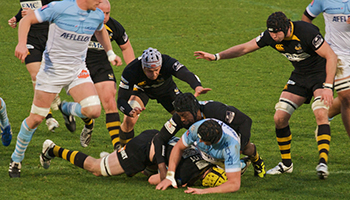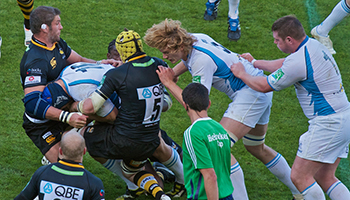 On BBC Panorama's programme, “Rugby and The Brain – Tackling the Truth”, the Chief Medical Officer of World Rugby, Martin Raftery, announced plans to alter the rules of the game to limit the risk of players suffering concussion, with a specific focus on tackling. Only a few days before, The Telegraph reported that “Jonathan Thomas quits with epilepsy caused by multiple concussion”. Following mild seizures and memory loss, that he believes was the result of sustaining multiple concussions, the Worcester forward and former Welsh national player announced that he was retiring from rugby on medical advice. He is not alone - in the media this year, it has been reported that a number of high profile rugby players such as Rory Watt-Jones (Cardiff Blues) and Declan Fitzpatrick (Ulster and Ireland) have also had to retire from the sport due to concussion-related injuries.
On BBC Panorama's programme, “Rugby and The Brain – Tackling the Truth”, the Chief Medical Officer of World Rugby, Martin Raftery, announced plans to alter the rules of the game to limit the risk of players suffering concussion, with a specific focus on tackling. Only a few days before, The Telegraph reported that “Jonathan Thomas quits with epilepsy caused by multiple concussion”. Following mild seizures and memory loss, that he believes was the result of sustaining multiple concussions, the Worcester forward and former Welsh national player announced that he was retiring from rugby on medical advice. He is not alone - in the media this year, it has been reported that a number of high profile rugby players such as Rory Watt-Jones (Cardiff Blues) and Declan Fitzpatrick (Ulster and Ireland) have also had to retire from the sport due to concussion-related injuries.
Now in light of those stories, and with the Rugby World Cup underway and all the excitement that has already been ignited, the pragmatic and perhaps more curmudgeon-like souls amongst us turn our attention to the dangers associated with the sport that kindles our national passions. Of all the injuries that can occur in rugby, concussion is now the number one cause of players missing matches through injury at elite levels.
Concussion can occur in any situation where a blow to the head occurs, such as in road traffic accidents or as a result of a work-related accident. However, its incidence is becoming increasingly common in athletes who are prone to knocks to the head as part of their sport. Certain sports are more susceptible than others, such as rugby, NFL football, boxing, ice-hockey, football (soccer), equestrian sports, cycling, and diving. It is so topical an issue that in December, a controversial Hollywood blockbuster featuring Will Smith will be released simply entitled “Concussion”. In the United States, there has been a prolonged debate about the health dangers of NFL football, following the mounting evidence that repeated concussions can lead to degenerative brain disease - chronic traumatic encephalopathy (CTE). CTE is a neurodegenerative disorder characterised by a diminished ability to think critically, slower motor skills, and can lead to volatile mood swings. Unfortunately, at the current time, CTE can only be definitively diagnosed post-mortem. These risks, alongside the large financial settlements that have been awarded to former NFL players who have suffered multiple concussions, maked us wonder whether rugby may be the next sport in the concussion spotlight and whether the risks associated with rugby comprises a price worth paying.
 But it is not all doom and gloom - although researchers have found that concussions in rugby are common, it has been found that concussion accounts for 29% of all injuries associated with illegal play, but only 9% of injuries sustained in legal play (Gardner, Iverson, Levi, Schofield, Kay-Lambkin et al., 2015). Accordingly, Roberts, Trewartha, England, and Stokes (2015) investigated collapsed scrums and collision tackles, and found that injury prevention in the tackle should focus on technique, with strict enforcement of existing rules for illegal collision tackles. Furthermore, World Rugby is taking a proactive stance on concussion identification and management, heading towards “a cross-sport and society approach to concussion, to ensure consistency of research, education, prevention and management strategies to further protect athletes and members of the public”.
But it is not all doom and gloom - although researchers have found that concussions in rugby are common, it has been found that concussion accounts for 29% of all injuries associated with illegal play, but only 9% of injuries sustained in legal play (Gardner, Iverson, Levi, Schofield, Kay-Lambkin et al., 2015). Accordingly, Roberts, Trewartha, England, and Stokes (2015) investigated collapsed scrums and collision tackles, and found that injury prevention in the tackle should focus on technique, with strict enforcement of existing rules for illegal collision tackles. Furthermore, World Rugby is taking a proactive stance on concussion identification and management, heading towards “a cross-sport and society approach to concussion, to ensure consistency of research, education, prevention and management strategies to further protect athletes and members of the public”.
Sports such as rugby carry risks, but through legal play and active pitch-side management of suspected head injuries, we can but hope that this World Cup is not remembered for reports of players with serious head-related injuries, but for exciting (legal) play and home nation success.
To learn more about sports and fitness, find videos, articles, games and free courses on OpenLearn.
This topic will be covered further in a new Open University module coming soon. If you're interested in studying Sports and Fitness formally, explore more courses and qualifications we offer in this subject area.
This article was first published on the OU Sports & Fitness blog.
Rate and Review
Rate this article
Review this article
Log into OpenLearn to leave reviews and join in the conversation.
Article reviews